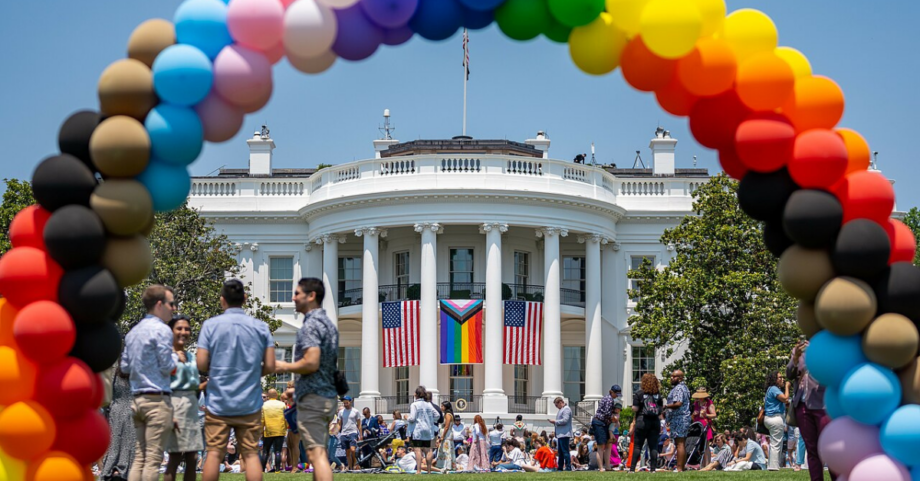A 2022 survey by the Pew Research Center found that about 7% of Americans proudly identify as lesbian, gay, or bisexual. Within this spectrum of identities, 1.6% of adults in the U.S. are transgender or nonbinary, meaning their gender differs from their birth sex. Some identify as men or women, while others use terms like nonbinary, gender fluid, or agender.
Heading into November's presidential election, sexual orientation and gender identity are at the center of many national debates, and voter's opinions vary widely, along partisan lines. A recent Pew Research Center survey reveals that 59% of Biden supporters believe a person's gender can differ from their sex at birth, while only 9% of Trump supporters agree.
Trump supporters overwhelmingly view gender as determined by a person's sex assigned at birth, while a majority of Biden supporters, by a less one-sided margin, say someone can be a man or woman even if that is different from their sex assigned at birth.
Naomi Clarke, Chief Diversity Officer at Flingster.com, finds the Pew Research Center survey results deeply concerning.
"This polarization profoundly impacts the daily lives and mental health of transgender and nonbinary individuals," says Clarke. "When nearly half the population, largely along partisan lines, holds conflicting views on such a fundamental aspect of identity, it creates an environment of heightened tension and anxiety for those directly affected. As a result, transgender and nonbinary individuals often face increased discrimination, invalidation of their identities, and mental health struggles due to this societal divide."
Kateryna Odarchenko, a political strategist and partner of SIC Group USA LLC with nine years of experience in democracy building and campaign management tells Kinkly that sexual orientation and gender identity will undoubtedly influence the upcoming elections, with opinions clearly splitting along partisan lines.
The Biden administration and the "Democratic team are actively working with the LGBTQ+ community, integrating it into the broader themes of inclusivity and minority rights protection," says Odarchenko, who also heads the nonprofit Institute for Democracy and Development or PolitA. "As you can see, these ideas, like other liberal values, are widely supported and accepted in progressive, Democratic states. Conversely, these issues are actively used in anti-campaigns among conservative Republican politicians and their states."
Digging into voters' opinions on LGBTQ+ issues
Here's a summary of what the survey revealed about voters' opinions on gender identity, pronouns, trans rights, and marriage equality.
How voters perceive gender identity
The study shows that 65% of registered voters believe sex assigned at birth determines gender, up from 53% of voters in 2017, while 34% think it can differ. Biden supporters reported a much broader range of opinions on gender identity compared to Trump supporters.
Among Trump supporters, 91% believe that birth sex determines gender compared to just 39% of Biden supporters. Conversely, 59% of Biden supporters accept that a person's gender can differ from their birth sex, versus just 9% of Trump supporters.
The Trump administration rolled back several protections for transgender individuals, and Clarke highlights that the current polarization means this election could profoundly impact LGBTQ+ rights, either advancing protections or leading to further setbacks depending on the results.
Changing views about gender identity
The percentage of Republican and Republican-leaning voters who say that sex at birth determines gender has grown from 79% in 2017 to 91% in 2024. In the same period, the percentage of Democratic and Democratic-leaning voters who share this belief has increased from 30% to 39%.
Voters' attitudes toward the use of gender-neutral pronouns
Over half of voters (56%) said they were uncomfortable with "they/them" pronouns, while 43% said they are comfortable with gender-neutral pronouns. As with opinions about gender identity, there are sizable differences between Biden and Trump supporters.
Read More: It Takes More Than Preferred Pronouns to Respect Gender Identity
Pronoun use reveals age divides among voters
Biden supporters are over three times more likely than Trump supporters to be comfortable with gender-neutral pronouns (66% vs. 20%). Voters under 50 are more comfortable with gender-neutral pronouns than those 50 and older, with a notable age gap among Biden supporters: 79% of those 18-49 are comfortable, compared to 56% of those 50 and older.
According to Clarke, generational differences in views on gender identity and LGBTQ+ rights often arise from varying levels of exposure and education. Younger generations, with greater access to diverse perspectives and inclusive education, tend to be more accepting. Engaging older generations in meaningful conversations requires patience, empathy, and relatable examples. Personal stories and experiences can be especially impactful, fostering emotional connections that pure facts and statistics may not achieve.
Because of this, Clarke advocates for a multi-faceted approach to bridge the gap and foster understanding across political lines. She emphasizes the importance of education, suggesting that integrating comprehensive, fact-based information about gender identity and the experiences of transgender and nonbinary people into school curriculums can build understanding from a young age.
The right to same-sex marriage
Two decades after the first same-sex marriages were legally performed in the U.S., Biden supporters are roughly five times as likely as Trump supporters to say legalizing same-sex marriage has been good for society.
According to Odarchenko, legislation recognizing same-sex marriages faces aggressive opposition in key Republican states, often citing religious practices.
However, like Clarke, Odarchenko has seen the impact of conversation and education in changing voters' opinions on LGBTQ+ issues. During canvassing and door-to-door campaigns, dedicated minority volunteer groups (Asian Americans, African Americans, and the LGBTQ+ community) enhanced communication effectiveness in certain Democratic states.
Opinions on LGBTQ+ issues vary by age
Younger Biden supporters are far more more supportive of LGBTQ+ issues with 63% saying it's a good thing that more people are identifying as LGBTQ+, and 67% supporting same-sex marriage. Among older Biden supporters, less than half of respondents share these opinions.
Older Trump supporters are more negative about same-sex marriage (57%) than younger ones (41%). However, opinions on LGBTQ+ issues among Trump supporters are similarly negative across all age groups.
Read the whole Pew Research Center study here.



















